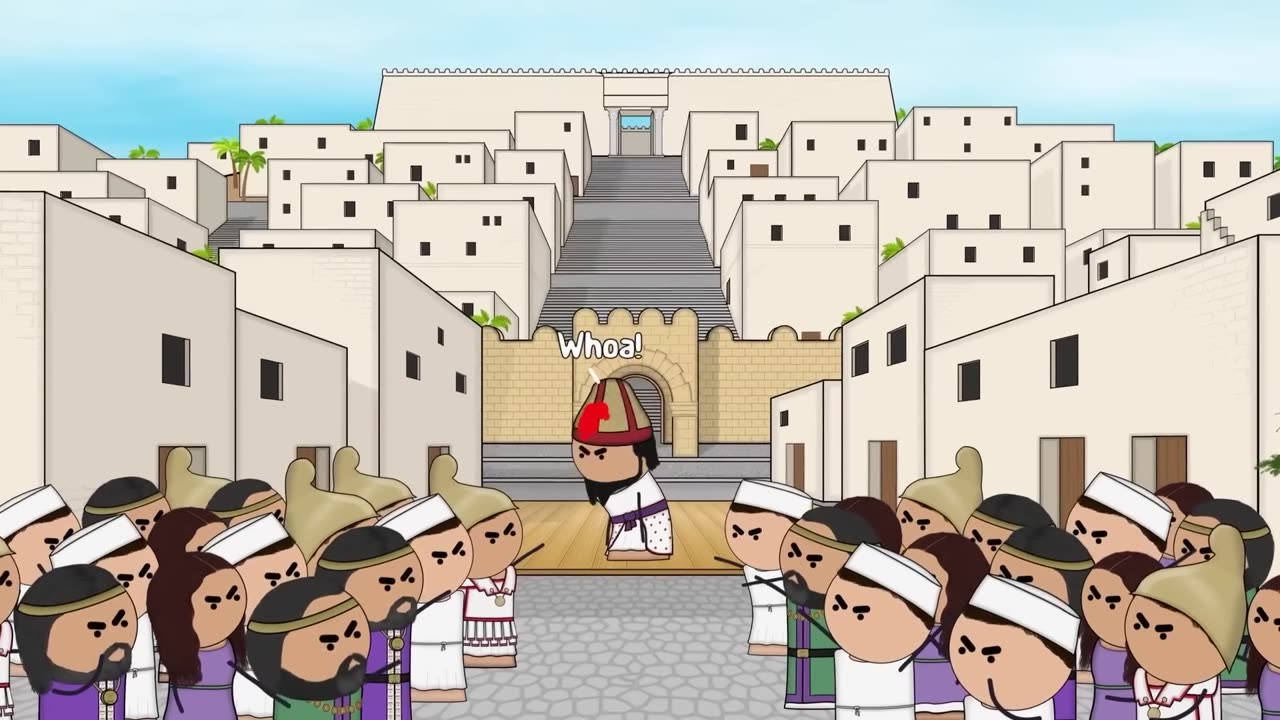Premium Only Content

The First Punic War - (Part 2)
The First Punic War (264–241 BC) was the first of three wars fought between Rome and Carthage, the two main powers of the western Mediterranean in the early 3rd century BC. For 23 years, in the longest continuous conflict and greatest naval war of antiquity, the two powers struggled for supremacy. The war was fought primarily on the Mediterranean island of Sicily and its surrounding waters, and also in North Africa. After immense losses on both sides, the Carthaginians were defeated.
The war began in 264 BC with the Romans gaining a foothold on Sicily at Messana (modern Messina). The Romans then pressed Syracuse, the only significant independent power on the island, into allying with them and laid siege to Carthage's main base at Akragas. A large Carthaginian army attempted to lift the siege in 262 BC but was heavily defeated at the Battle of Akragas. The Romans then built a navy to challenge the Carthaginians', and using novel tactics inflicted several defeats. A Carthaginian base on Corsica was seized, but an attack on Sardinia was repulsed; the base on Corsica was then lost. Taking advantage of their naval victories the Romans launched an invasion of North Africa, which the Carthaginians intercepted. At the Battle of Cape Ecnomus the Carthaginians were again beaten; this was possibly the largest naval battle in history by the number of combatants involved. The invasion initially went well and in 255 BC the Carthaginians sued for peace; the proposed terms were so harsh they fought on, defeating the invaders. The Romans sent a fleet to evacuate their survivors and the Carthaginians opposed it at the Battle of Cape Hermaeum off Africa; the Carthaginians were heavily defeated. The Roman fleet, in turn, was devastated by a storm while returning to Italy, losing most of its ships and over 100,000 men.
The war continued, with neither side able to gain a decisive advantage. The Carthaginians attacked and recaptured Akragas in 255 BC but, not believing they could hold the city, they razed and abandoned it. The Romans rapidly rebuilt their fleet, adding 220 new ships, and captured Panormus (modern Palermo) in 254 BC. The next year they lost 150 ships to a storm. In 251 BC the Carthaginians attempted to recapture Panormus, but were defeated in a battle outside the walls. Slowly the Romans had occupied most of Sicily; in 249 BC they besieged the last two Carthaginian strongholds – in the extreme west. They also launched a surprise attack on the Carthaginian fleet but were defeated at the Battle of Drepana. The Carthaginians followed up their victory and most of the remaining Roman warships were lost at the Battle of Phintias. After several years of stalemate, the Romans rebuilt their fleet again in 243 BC and effectively blockaded the Carthaginian garrisons. Carthage assembled a fleet that attempted to relieve them, but it was destroyed at the Battle of the Aegates Islands in 241 BC, forcing the cut-off Carthaginian troops on Sicily to negotiate for peace.
A treaty was agreed. By its terms Carthage paid large reparations and Sicily was annexed as a Roman province. Henceforth Rome was the leading military power in the western Mediterranean, and increasingly the Mediterranean region as a whole. The immense effort of building 1,000 galleys during the war laid the foundation for Rome's maritime dominance for 600 years. The end of the war sparked a major but unsuccessful revolt within the Carthaginian Empire. The unresolved strategic competition between Rome and Carthage led to the eruption of the Second Punic War in 218 BC. The term Punic comes from the Latin word Punicus (or Poenicus), meaning "Phoenician", and is a reference to the Carthaginians' Phoenician ancestry. The main source for almost every aspect of the First Punic War is the historian Polybius (c. 200 – c. 118 BC), a Greek sent to Rome in 167 BC as a hostage. His works include a now-lost manual on military tactics, but he is known today for The Histories, written sometime after 146 BC or about a century after the end of the war. Polybius's work is considered broadly objective and largely neutral as between Carthaginian and Roman points of view.
Carthaginian written records were destroyed along with their capital, Carthage, in 146 BC and so Polybius's account of the First Punic War is based on several, now-lost, Greek and Latin sources.[8] Polybius was an analytical historian and wherever possible personally interviewed participants in the events he wrote about. Only the first book of the 40 comprising The Histories deals with the First Punic War.[11] The accuracy of Polybius's account has been much debated over the past 150 years, but the modern consensus is to accept it largely at face value, and the details of the war in modern sources are almost entirely based on interpretations of Polybius's account. The modern historian Andrew Curry considers that "Polybius turns out to [be] fairly reliable"; while Dexter Hoyos describes him as "a remarkably well-informed, industrious, and insightful historian". Other, later, histories of the war exist, but in fragmentary or summary form. Modern historians usually take into account the fragmentary writings of various Roman annalists, especially Livy (who relied on Polybius), the Sicilian Greek Diodorus Siculus, and the later Greek writers Appian and Cassius Dio. The classicist Adrian Goldsworthy states that "Polybius' account is usually to be preferred when it differs with any of our other accounts".[10][note 1] Other sources include inscriptions, terrestrial archaeological evidence, and empirical evidence from reconstructions such as the trireme Olympias.
Since 2010, 19 bronze warship rams have been found by archaeologists in the sea off the west coast of Sicily, a mix of Roman and Carthaginian. Ten bronze helmets and hundreds of amphorae have also been found. The rams, seven of the helmets, and six intact amphorae, along with a large number of fragments, have since been recovered. It is believed the rams were each attached to a sunken warship when they were deposited on the seabed.[24] The archaeologists involved stated that the location of artefacts so far discovered supports Polybius's account of where the Battle of the Aegates Islands took place. Based on the dimensions of the recovered rams, the archaeologists who have studied them believe they all came from triremes, contrary to Polybius's account that all the warships involved were quinqueremes. However, they believe that the many amphorae identified confirm the accuracy of other aspects of Polybius's account of this battle: "It is the sought-after convergence of the archaeological and historical records."
#FirstPunicWar
#AncientHistory
#PunicWars
#HistoryLessons
#Warfare
#RomeVsCarthage
#HistoricalConflict
#MediterraneanHistory
#NavalWarfare
#Hannibal
#MilitaryStrategy
#AncientEmpires
#RiseOfRome
#CarthaginianEmpire
#BattleOfSicily
#HistoricalDocumentary
#ConflictAndConquest
#AncientBattles
#WarInAntiquity
#RomeHistory
-
 4:17:00
4:17:00
Tundra Tactical
23 hours ago $21.28 earnedSHOT SHOW 2025!!!!!! Whats Are We Looking Forward To Most
166K18 -
 22:53
22:53
Film Threat
1 day agoA TRIBUTE TO VISIONARY DIRECTOR DAVID LYNCH | Film Threat News
52.7K8 -
 20:30
20:30
Exploring With Nug
1 day ago $4.41 earnedMissing Father of 2 FOUND Underwater In Shallow Pond!
33.4K9 -
 19:19
19:19
This Bahamian Gyal
1 day agoThe View PRAISES Michelle Obama for DITCHING TRUMP inauguration, "when they go LOW, go even LOWER"
30.8K42 -
 14:25
14:25
Degenerate Jay
23 hours ago $7.79 earnedThe Flash Movie Failed Because People Hate The Character? Sure.
119K17 -
 28:30
28:30
CharLee Simons Presents Do Not Talk
6 days agoSam Anthony from YourNews.com (with host CharLee Simons)
70.4K4 -
 52:34
52:34
PMG
20 hours ago $3.97 earnedHannah Faulkner and Steve Friend | EXPOSE THE FBI CORRUPTION - KASH PATEL
49.9K8 -
 25:33
25:33
marcushouse
1 day ago $39.07 earnedStarship Exploded! What Went Wrong? Flight Test 7 Explained
206K66 -
 1:00:50
1:00:50
Squaring The Circle, A Randall Carlson Podcast
1 day ago#035 Cosmic Catastrophe In The Age Of Leo - Squaring The Circle: A Randall Carlson Podcast
131K34 -
 1:33:14
1:33:14
Jamie Kennedy
1 day agoThe LA Fires...
105K30